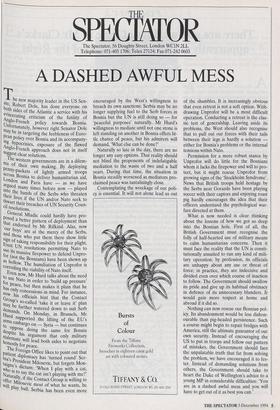The Spectator, 56 Doughty Street, London WC1N 2LL Telephone: 071-405
1706; Telex 27124; Fax 071-242 0603
A DASHED AWFUL MESS
The new majority leader in the US Sen- ate, Robert Dole, has done everyone on both sides of the Atlantic a service with his eviscerating criticism of the futility of Anglo-French policy towards Bosnia. Unfortunately, however right Senator Dole may be in targeting the feebleness of Euro- pean policy over Bosnia and its accompany- ing hypocrisies, exposure of the flawed Anglo-French approach does not in itself suggest clear solutions. The western governments are in a dilem- ma of their own making. By deploying Penny-packets of lightly armed troops across Bosnia to deliver humanitarian aid, London and Paris have — as we have argued many times before now — played into the hands of the Serbs who threaten their lives if the UN and/or Nato seek to thwart their breaches of UN Security Coun- cil resolutions. General Mladic could hardly have pro- posed a better pattern of deployment than that endorsed by Mr Rifkind. Alas, now 'our boys' are at the mercy of the Serbs, and those who put them there show little Sign of taking responsibility for their plight. Even UN resolutions permitting Nato to Use its massive firepower to defend Unpro- for (not the Bosnians) have been shown up as hollow. The humiliation of Unprofor is corroding the viability of Nato itself. Even now, Mr Hurd talks about the need to use Nato in order to 'build up pressure' for Peace, but then makes it plain that he has only concessions in mind. For instance, n,--, p9, 0w his officials hint that the Contact Group's 'take it or leave it' plan may be further watered down to suit Serb demands. On Monday, in Brussels, Mr Hurd supported the lifting of the EU's ants embargo on — Syria — but continues to °PPose doing the same for Bosnia despite his argument that only military stalemate will lead both sides to negotiate honestly for peace. The Foreign Office likes to point out that patient diplomacy has 'turned round' Ser- bia's President Milosevic, but forgets Mon- taigne's dictum: 'When I play with a cat, w. ho is to say the cat isn't playing with me?' Naturally, if the Contact Group is willing to Offer Milosevic most of what he wants, he will play ball. Serbia has been even more encouraged by the West's willingness to breach its own sanctions: Serbia may be no longer supplying fuel to the Serb forces in Bosnia but the UN is still doing so — for 'peaceful purposes' naturally. Mr Hurd's willingness to mediate until not one stone is left standing on another in Bosnia offers lit- tle chance of peace, but his admirers will demand, 'What else can be done?'
Naturally so late in the day, there are no longer any easy options. That reality should not blind the proponents of indefatigable mediation to the waste of two and a half years. During that time, the situation in Bosnia steadily worsened as mediators pro- claimed peace was tantalisingly close.
Contemplating the wreckage of our poli- cy is essential. It will not alone lead us out of the shambles. It is increasingly obvious that even retreat is not a soft option. With- drawing Unprofor will be a most difficult operation. Conducting a retreat is the clas- sic test of generalship. Leaving aside its problems, the West should also recognise that to pull out our forces with their tails between their legs is hardly a solution — either for Bosnia's problems or the internal tensions within Nato.
Permission for a more robust stance by Unprofor will do little for the Bosnians whom it lacks the firepower and will to pro- tect, but it might rescue Unprofor from growing signs of the 'Stockholm Syndrome'. News that British troops held hostage by the Serbs near Gorazde have been playing soccer with their captors and enjoying roast pig hardly encourages the idea that their officers understand the psychological war- fare directed at them.
What is now needed is clear thinking about the lessons of how we got so deep into the Bosnian hole. First of all, the British Government must recognise the folly of half-hearted use of military means to calm humanitarian concerns. Then it must face the reality that the UN is consti- tutionally unsuited to run any kind of mili- tary operation: by profession, its officials are unhappy about any use or threat of force; in practice, they are indecisive and divided even over which course of inaction to follow. The Government should swallow its pride and give up its habitual obstinacy in defence of its unnecessary blunders. It would gain more respect at home and abroad if it did so.
Nothing can now rescue our Bosnian pol- icy. Its abandonment would be less dishon- ourable than pig-headed persistence. Such a course might begin to repair bridges with America, still the ultimate guarantor of our own security. Instead of encouraging the US to put in troops and follow our pattern of mistakes, the Government should face the unpalatable truth that far from solving the problem, we have encouraged it to fes- ter. Instead of demanding solutions from others, the Government should take to heart the Duke of Wellington's advice to a young MP in considerable difficulties: 'You are in a dashed awful mess and you will have to get out of it as best you cah.'










































































 Previous page
Previous page